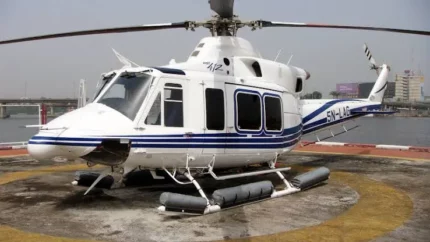The Nigerian government’s decision to suspend the $300 helicopter landing levy has been praised by industry stakeholders and business leaders. This move is anticipated to stimulate economic activities and alleviate operational challenges for aviation and oil sector firms, garnering widespread approval as a positive development.
The fee, part of the government’s revenue plan, demanded that helicopter operators pay $300 for each landing. This sparked criticism from different sectors, especially offshore oil and gas companies, who claimed the charge was excessive and hindered their business operations.
Minister of Aviation, Hadi Sirika, made the announcement in Abuja, emphasizing the government’s commitment to fostering a conducive business environment. “The suspension of the $300 helicopter landing levy reflects our dedication to supporting the aviation industry and ensuring that businesses can operate without undue financial burdens,” Sirika stated.
Industry experts and stakeholders have welcomed the suspension, noting that it will alleviate financial pressures on companies and enhance the efficiency of their operations. Many believe this move will have a positive ripple effect on the broader economy, particularly in sectors heavily reliant on helicopter services.
“The suspension of this levy is a significant relief for us,” said Chikwe Ijeoma, CEO of an oil services firm operating in the Niger Delta. “It allows us to allocate more resources towards critical operational needs rather than excessive fees. This decision demonstrates the government’s responsiveness to the concerns of the business community.”
The helicopter landing levy has been a contentious issue since its implementation, with many arguing that it placed an unnecessary strain on industries vital to Nigeria’s economic growth. The aviation sector, which plays a crucial role in facilitating transport and logistics for various industries, has been particularly vocal in opposing the fee.
“The aviation industry is a critical enabler of economic activity,” commented Olumide Ohunayo, an aviation analyst. “By suspending the landing levy, the government has shown its understanding of the sector’s importance and its willingness to take necessary actions to support its growth.”
The decision is also expected to benefit the tourism sector, which relies on helicopter services for transporting tourists to remote and scenic locations. Operators in this sector believe that the suspension of the levy will make Nigeria a more attractive destination for tourists, thereby contributing to the country’s tourism revenues.
“We anticipate an increase in tourist arrivals, especially in areas that require helicopter transport,” said Funmi Iyanda, a tour operator. “The reduced cost will enable us to offer more competitive packages and improve the overall experience for our clients.”
While the suspension of the levy is a positive development, some stakeholders have called for a comprehensive review of the regulatory framework governing the aviation industry. They argue that sustainable growth will require not only the removal of burdensome fees but also the implementation of policies that support innovation and infrastructure development.
“The suspension is a good first step, but there is still much work to be done,” said Captain Rabiu Yadudu, Managing Director of the Federal Airports Authority of Nigeria. “We need to ensure that our regulatory environment is conducive to long-term growth and that we are investing in the infrastructure needed to support the industry’s expansion.”
As the government moves forward with its plans to enhance the business environment, the suspension of the $300 helicopter landing levy stands as a testament to its commitment to addressing the concerns of the private sector. This decision is expected to pave the way for more collaborative efforts between the government and industry stakeholders, ultimately driving economic growth and development in Nigeria.
